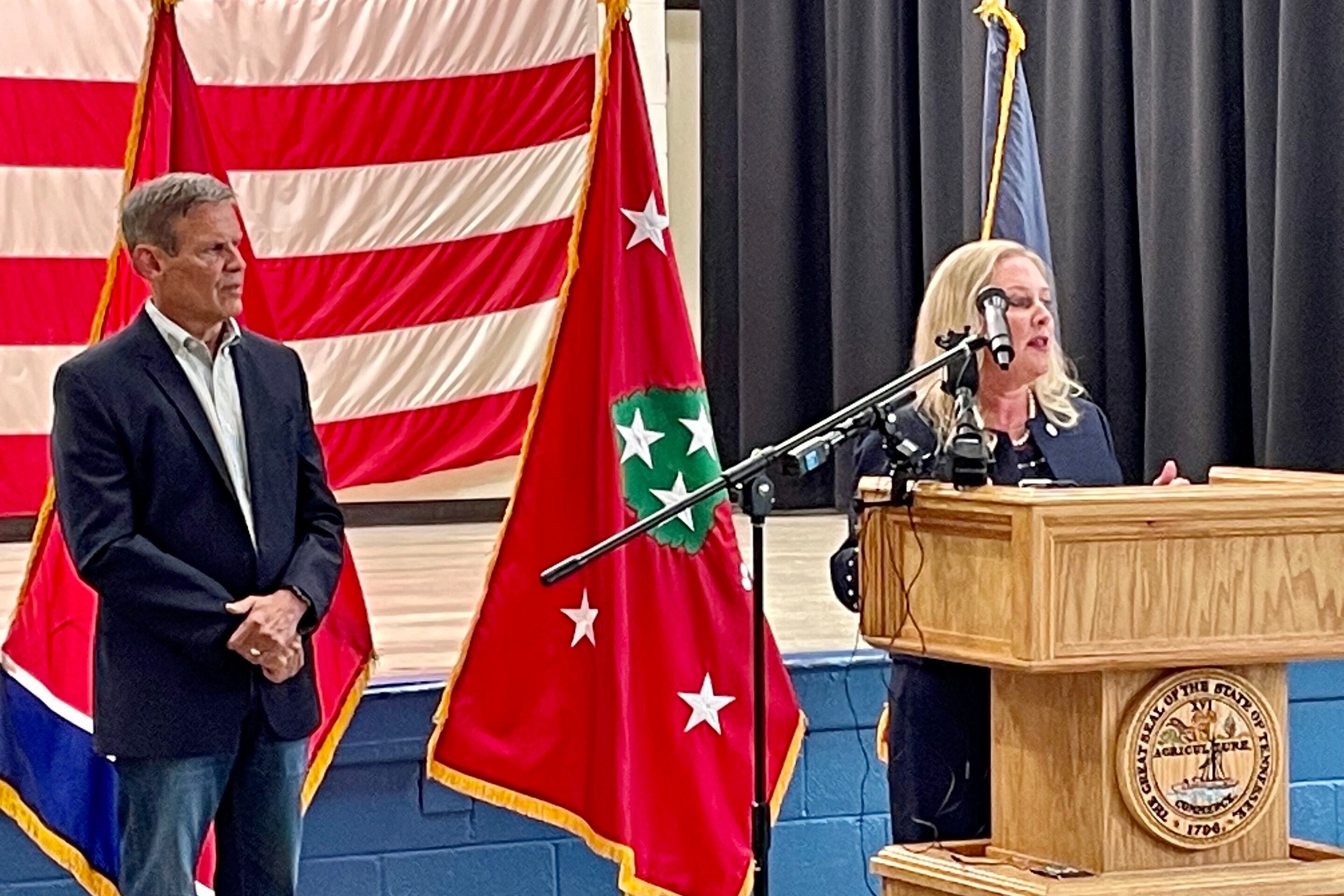Gov. Bill Lee said Wednesday he has no plans to allow school systems to shift to virtual learning, despite another COVID surge and calls from district leaders wanting flexibility to manage the public health crisis.
At a news conference, Lee said he’s not considering issuing an executive order that would let district leaders have the same remote options as last year — “in part because we saw just how devastating the learning loss impact was when we went remote.”
But his education chief, Penny Schwinn, clarified later that districts already have authority to temporarily move individual students, classes, or even entire schools online in response to a COVID outbreak. In those cases, she said, districts would not have to dip into their allotment of days stockpiled for inclement weather, sickness, or staffing problems.
“Right now, [remote instruction] is available to use on a school-by-school basis and an individual basis. You cannot use it district-wide,” Schwinn told Chalkbeat.
The approach means Tennessee expects school leaders to use a scalpel instead of a sledgehammer to respond as cases of COVID’s delta variant increase dramatically among school-age children.
The state logged about 14,000 pediatric cases last week, an increase of 57% over the prior week, and more of those children are needing medical attention. The biggest spike has been in children ages 5-13, most of whom are still too young to be vaccinated, said Dr. Lisa Piercey, state health commissioner.
Lee, Piercey, and Schwinn spoke with reporters at the Nashville headquarters of the Tennessee Emergency Management Agency after the governor returned from touring flood-ravaged Humphreys County, west of Nashville.
While he does not support mandates, Lee emphasized the importance of getting vaccinated and wearing masks to lessen virus spread in both classrooms and communities.
“Let me just say and remind parents, you have tools to protect your children and to help mitigate the spread,” Lee said. “[For ages] 12 and over, vaccine is the tool. Every parent can have their children wear a mask to school as a tool to mitigate the spread.”
His comments came just days after school leaders in Memphis urged families to contact the governor’s office about needing remote flexibility for Shelby County Schools — not only because of ill and quarantined students but because of challenges staffing classrooms.
Some district or charter administrators already have dipped into their stockpiled days to close schools because of quarantined teachers or staff. In Memphis this week, Frayser Community Schools closed MLK College Prep for two days, while Williamson County Schools closed one of its middle schools for one day last week.
In a letter Tuesday, two school superintendents in the governor’s home county worried the situation isn’t sustainable.
Jason Golden, with Williamson County Schools, and David Snowden, with Franklin Special School District, asked state lawmakers to lobby the governor to reinstate remote learning as a tool to help manage COVID spread. They said many of their schools were approaching a staffing “crisis point” and asked for flexibility to shift schools or grades to remote instruction to avoid depleting stockpiled days before winter arrives.
But Schwinn said districts have options beyond using stockpiled days to respond to COVID-related staffing problems. Those include holding remote classes on a temporary basis, or allowing a quarantined teacher to virtually teach students who remain in their school buildings under the supervision of another adult.
“I trust my district leaders to make the best decisions for their communities on that,” said Schwinn, adding that the state isn’t defining what constitutes an outbreak or a staffing shortage.
Schwinn emphasized the state doesn’t plan to move to a “blanket approach” on remote learning.
“Because there are so many individual quarantines at individual schools, there are some superintendents who would like to have a more uniform approach across the district. But we’re not going to do that,” she said.
In a separate interview, House Speaker Cameron Sexton said more discussion is needed to clear up confusion about policies that are supposed to address ongoing disruptions to learning.
“We’re going to be facing this for the next 5 or 10 years easily as we go through COVID. I think there needs to be a bigger conversation about the direction for school boards to set the policy so parents know what it is and understand it,” Sexton said.
Elizabeth Tullos, a spokeswoman for the State Board of Education, said any decision to close schools should be made at the local level. If any closures exceed a district’s number of stockpiled days, districts may ask Schwinn for a waiver from the required 180 days of instruction.
“Along with other state leaders, the State Board of Education is monitoring what rules and policies, if any, are needed in further response to the COVID-19 pandemic,” Tullos said.








